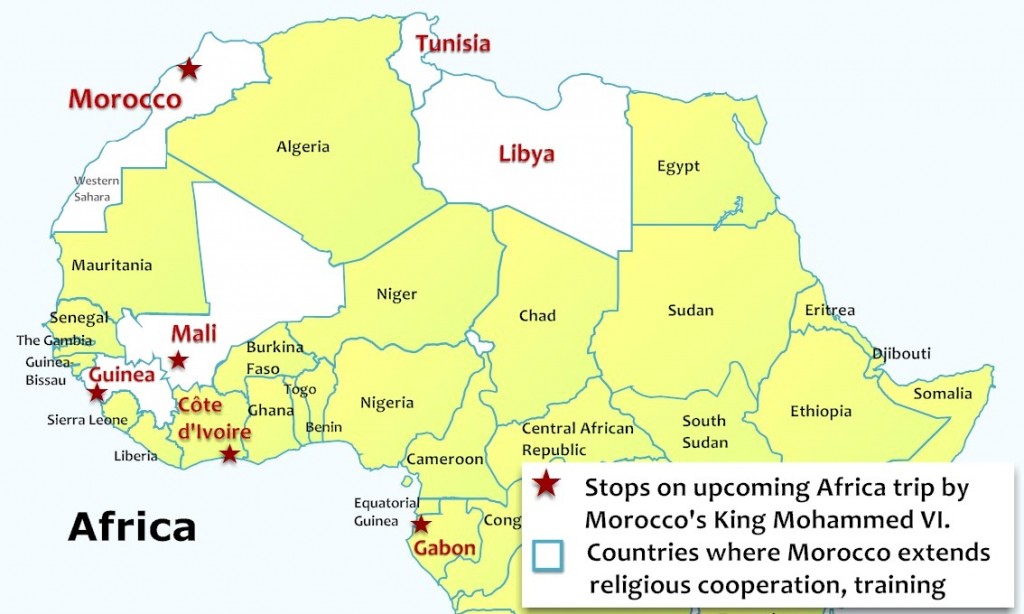Updated
King of Morocco Promotes Development in Africa by Africa – Jean R. AbiNader

Jean R. AbiNader, Exec. Dir., Moroccan American Trade and Investment Center
Jean R. AbiNader, MATIC
February 27, 2014
While much of the news coverage of Western and Central Africa focuses either on security concerns or problems related to balanced growth, the King of Morocco took the debate in another direction, all but unnoticed in the Western media. At the Moroccan-Ivorian Economic Forum, which opened in Abidjan on February 24, King Mohammed VI laid out a compelling vision for Africa’s development. He said that “Today, it is the economic dimension which predominates. It is a crucial component of diplomatic relations. At one time, cooperation was based on trust and on historical ties. Today, it increasingly hinges on efficiency, performance, and credibility.”
The King is concerned that too much time is spent on political discussions rather than concrete actions to spur development. With respect to credibility he opined that “it requires that the continent’s wealth should benefit African peoples in the first place. This means that South-South cooperation should be at the heart of intra-African economic partnerships.” His words reflect the increasing disenchantment of Africans with international firms, backed by their governments, which extract commodities, undersell local manufacturing, and leave no long-term tangible benefits to citizens of the host countries.
Employment and economic growth received special attention, “job creation and the expansion of small and medium-sized businesses and industries, which are the continent’s real engine of growth and the main job provider for its young people.” Clearly understanding these challenges from similar ones in Morocco, he commented that “Africa is a great continent. It therefore has to take its destiny in its own hands. Africa is no longer a colonized continent. This is why Africa should learn to trust Africa [emphasis added].”
Partnerships not Handouts
According to studies by the Center for Strategic and International Studies (CSIS) and the Atlantic Council, Morocco and Africa are too often treated as “part of a problem.” The King took exception, as did these leading think tanks, with that characterization.
“Our continent does not need assistance so much as mutually profitable partnerships. Africa needs human and social development projects more than it needs humanitarian aid…The 21st century should be that of African peoples’ triumph over the ravages of underdevelopment, poverty, and exclusion.”
The King believes that there is much to be gained from partnerships for development. “Africa should forge further fruitful partnerships with the many developed countries that show a constant interest in and sincere commitment to economic progress and human development in Africa, while being actively involved in them…It should also benefit from the opportunities offered by triangular cooperation as an innovative tool that facilitates joint efforts and helps achieve optimum use of resources.” Morocco has much to offer in this regard, as it has used its networks and regional expertise to carry out a number of triangular projects in Africa using funding from international sources.
The bottom line, according to the King, is implementing strategies that utilize African expertise to expand economic growth. “It is our collective duty to make sure globalization becomes a positive force conducive to development in Africa…the creativity and dynamism of the private sector should focus on specific promising areas such as agriculture, industry, science and technology, and infrastructure development….Leveraging South-South public-private partnerships and the transfer of technology are key elements in this respect.”
Achieving Its Potential
King Mohammed VI did not avoid the tough issues of the impact of local conflicts and growing threats from extremists. “These challenges [which threaten stability and hinder development] can only be met through cooperation, solidarity between African peoples, and respect for the States’ sovereignty and territorial integrity.” He emphasizes that “This makes institutional capacity-building in African States a strategic objective. Better governance, progress based on the rule of law, and the peaceful settlement of conflicts must constitute shared priorities.”
 His message about the need for change is clear. “This objective [prosperity for future generations] will even be more readily attainable when Africa overcomes its Afro-pessimism and unlocks its intellectual and material potential as well as that of all African peoples. Just imagine what our continent will look like, once it frees itself of its constraints and burdens!”
His message about the need for change is clear. “This objective [prosperity for future generations] will even be more readily attainable when Africa overcomes its Afro-pessimism and unlocks its intellectual and material potential as well as that of all African peoples. Just imagine what our continent will look like, once it frees itself of its constraints and burdens!”
The King’s optimism on these visits to Mali, Guinea, Ivory Coast, and Gabon is striking. In Mali, the two governments signed 17 bilateral agreements, and another 26 investment and public-private partnerships in Ivory Coast, more indicators of the substance behind King Mohammed’s messages.
These are hopeful signs that Morocco and Africa, which are not without challenges to achieving their goals of prosperity, equality, and security, can forge commitments and partnerships to advance Africa towards its continental potential.
Jean R. AbiNader is Executive Director of the Moroccan American Trade and Investment Center.
Co-published with Fair Observer (http://www.fairobserver.com/).
Comments
[…] message on African solutions to African challenges echoes remarks by King Mohammed VI at a business forum in Ivory Coast this year. They have become a core message for how Africa, made up of 54 countries that do only 12 […]